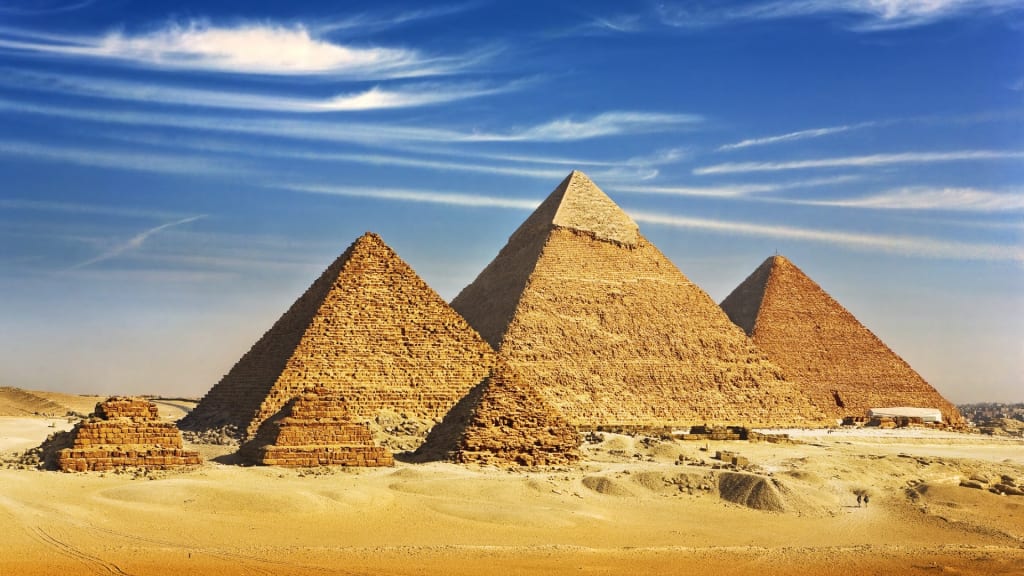"In the Shadows of Pyramids: Ancient Egypt Unveiled"
Unraveling the Mysteries and Majesty of Ancient Egypt

In the tapestry of ancient civilizations, few evoke the mystique and grandeur of Ancient Egypt. Nestled along the fertile banks of the Nile River, this enigmatic civilization flourished for millennia, leaving an indelible imprint on history, art, and human imagination. As we venture into the shadows of pyramids, we unveil the captivating saga of Ancient Egypt—a realm of pharaohs, gods, and timeless wonders that continues to captivate the modern world.
The heartbeat of Ancient Egypt was the Nile, a life-giving river that nurtured the fertile strip of land flanking its banks. This geographic blessing facilitated agricultural abundance, allowing the ancient Egyptians to develop a sophisticated society. The annual flooding of the Nile, known as the inundation, served as a cosmic rhythm, heralding prosperity and sustaining a civilization that endured for over three millennia.
At the helm of this ancient realm stood the pharaohs, revered as living gods on Earth. The grandeur of Egypt's monumental architecture, epitomized by the iconic pyramids, reflected the divine authority and immortal legacy these rulers sought to perpetuate. The Giza Plateau, home to the Great Pyramid of Khufu, the Pyramid of Khafre, and the Pyramid of Menkaure, stands as a testament to the architectural prowess and astronomical precision of the ancient Egyptians.
The pyramids, colossal in scale and enigmatic in purpose, have long been shrouded in mystery. Constructed as elaborate tombs for pharaohs, these architectural marvels housed not only mortal remains but also treasures and artifacts believed to accompany the rulers into the afterlife. The Great Sphinx, standing sentinel near the pyramids, further adds to the enigma, its inscrutable gaze inviting speculation and awe.
Ancient Egypt's religious tapestry was woven with a rich array of deities and mythologies. The pantheon included gods and goddesses like Ra, the sun god; Isis, the goddess of magic; and Osiris, the god of the afterlife. The concept of ma'at, representing cosmic balance and order, permeated Egyptian beliefs, influencing both religious and societal practices.
The Nile Delta, where the river meets the Mediterranean, was the gateway to Egypt's intricate network of trade and cultural exchange. The bustling city of Alexandria, founded by Alexander the Great in 331 BCE, emerged as a cosmopolitan center of learning, boasting the Great Library and the Pharos Lighthouse, one of the Seven Wonders of the Ancient World.
The ancient Egyptians' mastery extended beyond architecture and religion to fields like medicine, mathematics, and literature. The Ebers Papyrus, an ancient medical document, provides insights into their understanding of ailments and treatments. Hieroglyphs, the intricate system of writing, adorned temples and tombs, narrating tales of pharaohs' exploits and conveying the wisdom of scribes.
The afterlife held profound significance in Egyptian beliefs, shaping funerary practices and rituals. Elaborate tombs, such as those in the Valley of the Kings, concealed treasures and intricate murals depicting the journey of the deceased through the underworld. The Book of the Dead, a guide to the afterlife, accompanied the departed, offering spells and instructions for navigating the challenges of the beyond.
As we delve into the shadows of pyramids, we encounter the echoes of a civilization that thrived along the banks of the Nile. The decline of Ancient Egypt was a gradual process, marked by external invasions, internal strife, and the erosion of cultural traditions. The conquests of Alexander the Great and the subsequent rule of the Ptolemies ushered in a new era, blending Egyptian and Hellenistic influences.
In the shadows of pyramids, Ancient Egypt lives on in the collective consciousness of humanity. The Rosetta Stone, discovered in 1799, became the key to deciphering hieroglyphs, unlocking the secrets of this ancient script. Archaeological discoveries, ongoing to this day, continue to unveil the treasures and untold stories buried beneath the sands of time.
The allure of Ancient Egypt persists as a testament to human ingenuity, resilience, and the timeless quest for meaning. The pyramids, temples, and artifacts that dot the landscape serve as windows into a bygone era, inviting us to marvel at the achievements of those who once walked the fertile banks of the Nile. In the shadows of pyramids, the legacy of Ancient Egypt endures—a timeless testament to the indomitable spirit of a civilization that sculpted the sands of history.
About the Creator
Andrew
I collect whispers of dreams and spin them into tales. Let me unlock the doors of your imagination. Come, turn the pages and wander through the worlds I weave.
Enjoyed the story? Support the Creator.
Subscribe for free to receive all their stories in your feed. You could also pledge your support or give them a one-off tip, letting them know you appreciate their work.






Comments
There are no comments for this story
Be the first to respond and start the conversation.